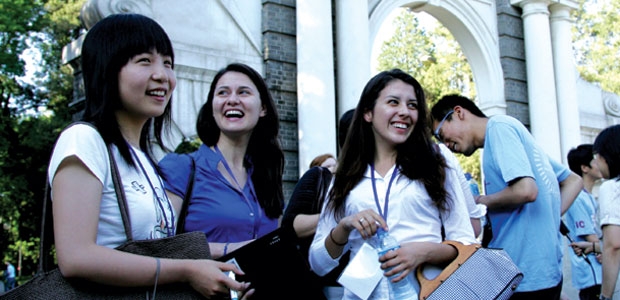
Tsinghua revels in its structural role on the global stage: forging connections between East and West, writes Chen Jining.
Tsinghua University was established in 1911 as a preparatory school for domestic students sent by the Chinese government to study in the US.
Many of its earliest students returned home after their studies to make powerful contributions in all aspects of social endeavour: some became industrial leaders, others policymakers and some made major intellectual and scientific advancements, benefiting China and the world. Early presidents of Tsinghua were all members of that vanguard; and thanks to their wide connections with world-leading institutions and scholars such as Niels Bohr, Paul Dirac, Paul Langevin and others, they laid the foundations that allowed Tsinghua to become a pioneer among its peers.
The university has made a dramatic mark on modern China by importing as well as creating advanced knowledge and technology. Tsinghua has helped our nation meet the challenges of war and reconstruction, poverty and development, industrialisation and technological revolution, and social and environmental transformation. Serving society has always been its overarching ambition: in light of China’s opening-up policy and a drastically changing global scene, it is expected to meet its obligations by being at the forefront of both.
One might argue that a single university can have only a limited impact on local society, let alone the entire world. But the rationale behind Tsinghua’s decision to act as a bridge between East and West lies in both historical context and contemporary opportunity. Over the years, the university has promoted the fusion of Eastern and Western culture, as well as encouraging collaboration between China and the rest of the world.
Last year, Tsinghua launched its Schwarzman Scholars programme, a $300 million (£181 million) endowment inspired by Rhodes scholarships, with the aim of bestowing on future world leaders in-depth understanding of China. Earlier this year we established the XIN Center, an international innovation and education hub serving to tackle global grand challenges through cross-disciplinary collaboration between China, Israel and the world. Tsinghua has benefited greatly from its involvement in all these strategic international initiatives. The university has also fashioned positive changes domestically and internationally as a result of its collaborative strategy.
One cannot overstate the importance of appreciating one’s home flavours before digging into global platters. We have strived to be innovative with our own educational model, improving the level and quality of our pedagogy while maintaining Tsinghua’s traditional core features. For instance, we have stepped up efforts to establish a liberal arts programme and have launched XuetangX, a massive open online course platform that has cumulatively enrolled more than 350,000 people. We insist that our essential characteristics remain manifest throughout our reforms and innovations, while at the same time absorbing notions and ideas from overseas.
Apart from conveying knowledge and skill, the essence of education is to expand students’ capacity to reason freely and critically: successful graduates must be able to think and act for themselves. University serves this purpose by fostering talents and developing the leaders of the future. Tsinghua has established student exchange partnerships with nearly 100 overseas institutions and roughly 40 per cent of our undergraduates now have overseas experience. We find that those who have seen the world elsewhere usually become more open-minded and critical. The capacity for making fruitful use of information and the methods of thinking learned overseas have a profound impact on students in every aspect of life. They become advocates with roots in every corner of the world – bearing Chinese values and culture with a Western touch.
Tsinghua’s mission and influence have evolved gradually over the past century, but never has the university ceased to perform its role as a bridge connecting China and the world. How its transformation into a globalised university will affect its teaching and research remains a challenge for Tsinghua, but we certainly expect to see more partners join us in this important effort in the near future.
Chen Jining is president, Tsinghua University
Register to continue
Why register?
- Registration is free and only takes a moment
- Once registered, you can read 3 articles a month
- Sign up for our newsletter
Subscribe
Or subscribe for unlimited access to:
- Unlimited access to news, views, insights & reviews
- Digital editions
- Digital access to THE’s university and college rankings analysis
Already registered or a current subscriber? Login